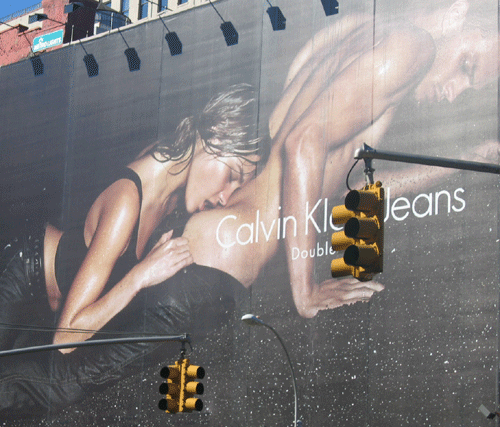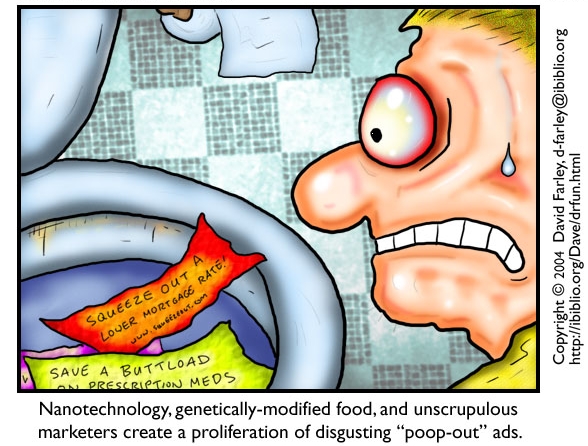Not that we'll ever believe it could possibly be reached but after headvertising, dogvertising, forehead advertising, assverting, bravertising, blogvertising, bloodvertising, adverblogging, invertising, advergaming, chipvertising, thongvertising, replacevertising, busvertising, police car advertising, adverwear, and urinal advertising, the final frontier of advertising would have to resemble something close to the "Poop-Out" ad.
Envisioned in a cartoon by David Farley, this yet-to-be-created ad medium combines "nanotechnology, genetically-modified food and unscrupulous marketers" yielding these scary messages floating in your toilet bowl.
Following its launch of the Burger King Dr. Angus site created by Crispin Porter + Bogusky, Burger King, along with CPB has launched an extension to that site called Dr. Angus Interventions which offers the interactive qualities of another Burger King site, Subservient Chicken.
Offering advice for those who clean too much, are couch potatoes or who continually send company-wide emails, Doctor Angus Interventions dispenses verbal advice that visitors can edit to suit their needs or to suit the needs of others with a "forward to a friend" feature. The site is being seeded by viral firm DMC in London.
From their experience with Subservient Chicken, Crispin Porter + Bogusky found people want to engage and control the websites they visit. CPP Creative Director Jeff Benjamin said,"We learned from Subservient Chicken that people want to be able to customize what's happening. When we originally concepted it, we didn't have so much customization. We were going to use real voice clips [in the latest effort], but we decided it would be more interesting if Dr. Angus could say what you wanted him to. The added customization made the intervention make much more sense."
We'll refer to this as another "brand toy" - a device which is created to be amusing, engaging and/ or helpful all while subtly branding. It's what's needed to amuse the "bored in two seconds, jaded, ad-hating, ad-skipping" generation.
Always one to push limits, Calvin Klein now has a guy close to serving his salad to some hot chick on Houston and Lafayette in New York. Via Fleshbot.

If for no other reason than to enjoy some British wit.
The Wall Street Journal is further expanding beyond its original purpose of providing in depth financial news and announced a few changes Tuesday allowing the paper to provide advertisers with more editorially relevant placement options. Following the launch of its Personal Journal Section in 2002, two new editorial features will be added. "Personal Finance Wednesday" will provide individual financial advice and "Home and Health Thursday" will focus on entertainment and home technology. New page pages units on A2 and A3 will be added as well which will provide "prominent visibility in an uncluttered environment." The paper's "Weekend Journal section will expand to include part 2's with seasonal focus beginning with "Weekend Journal Holiday Guide" on December 3.
A study just out by the Ponemon Institute and provided to USA Today found, unsurprisingly, consumers feel bombarded by online ads, want less ad clutter but won't pay for content not supported by ads. Other findings include :
- 80 percent find pop ups annoying.
- 60 percent dislike spam (who are those other 40 percent?).
- 60 percent are always annoyed by banners.
- While ads are hated, 31 percent respond to ads.
- 7 percent made a purchase from a banner.
- 65 percent won't pay for ad blocking services.
- 52 percent are more likely to respond if ad is relevant.
- 66 percent state relevant banner ads are less annoying.
- 45 percent will volunteer personal info in return for more targeted ads.
- 55 percent would respond to an ad that was targeted but was not based on the requirement of providing personal info.
- 31 percent would trust an advertiser more if they had a solid privacy statement backed by a third party such as TRUSTe or BBB.
- Perhaps shedding the brightest light on "ad hate factor" is the finding that 44 percent think unwanted ads should be banned by law.
While it's nice to see it in black and white, the findings are not suprising.
We've always known most advertising of any kind is disliked and no one wants to pay for content when they can get it for free. While we are not there yet, we will arrive at the day when upwards of 90 percent of delivered ad content is 100 percent relevant to a consumer. Until then, expect more survey results like this.





